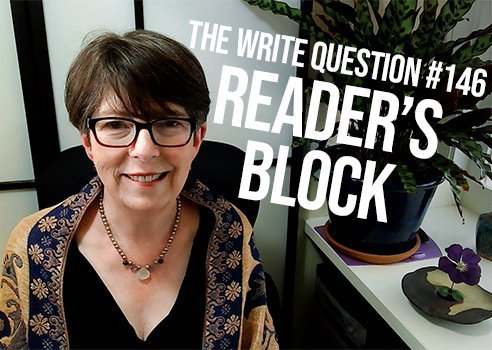Viewing time: 4 mins. 41 secs.
The Write Question is a weekly video podcast about writing that I started in 2017 and that ran, more or less weekly, until April 2022. This is a republication of issue #146, which discusses how to deal with reader’s block. The post first ran on June 26/20.
Transcript:
How do you deal with reader’s block? That’s the topic I’m addressing today in The Write Question. I’m Daphne Gray-Grant, the Publication Coach, still in pandemic mode.
I have a question from Julie Roberts, a writer based in Austin, Texas. Here’s what she’s asked by email…
“I know you address the question of writer’s block quite frequently, but I wonder if you’ve ever heard of reader’s block? I’ve never read more than a couple of books a year but I can’t even manage that relatively low level these days. Do you have any suggestions for me?”
Thanks for your question, Julie. I’ve addressed this topic before – and I provide a link to that video in the show notes below. But I’ve never confessed to my own two experiences of reader’s block. Let me tell you about them now. I hope they’ll give you some comfort — and maybe even some guidance.
I’ve been an inveterate reader for most of my life. When I was young, I always had a novel on the corner of my desk at school. As soon as I had my assigned work done, I’d go back to reading. Fortunately, my teachers were wise enough to encourage this behaviour.
At home, I’d start reading early in the day. If the newspaper wasn’t handy, I’d scan the back of the cereal box at the breakfast table. I live in bilingual Canada, so sometimes that meant reading the ingredients list in French, which I didn’t know how to speak!
University interfered with my book reading a little — mainly because I studied political science and I had to read a lot of journal articles. But as soon as I graduated, I returned to reading novels — and non-fiction books — with a vengeance.
This happy reading habit ground to a halt, however, after I gave birth to triplets. For the first five years, I barely had time to shower, never mind read. Of course, we made time to read to the kids, and we managed to get through most of Harry Potter by the time they hit the age of 12. That’s when their diverging interests — music vs. sports vs. friends — caused them to stop being willing to listen to the same book.
You didn’t include any of your own biographical detail, Julie, but if you’re a mother of young children, understand that it’s perfectly normal not to have enough time for your own reading.
And don’t blame yourself for this. Just like I don’t blame myself for not being 5 ft 10 inches — even though that would make it a lot easier for me to reach the higher shelves in the kitchen. Yes, being the mother of young children is a type of reader’s block but, guess what? It’s time limited! They won’t be young forever.
I encountered my second battle with reader’s block following a stroke I had in 2002. I was 45-years-old at the time — way too young for a stroke. And I had no risk factors, either. In fact, my blood pressure is so low that when doctors see me, many of them tell me to eat more salt.
Anyway, a stroke is a brain injury, and I found it left me not only exhausted but also completely uninterested in reading. For perhaps the longest time in my adult life — more than six months — I didn’t read a single book.
The reader’s block finally ended when my husband and I went away for a quiet weekend and I brought the novel White Oleander by Janet Fitch with me. It was raining and I found the book engaging enough that I finished it that weekend.
To me, the big secret to breaking reader’s block is to have a book that really grabs you. Don’t prejudge yourself. Don’t think that thrillers or romance novels or sci fi, or whatever genre you like isn’t ‘good enough’ to count. The main thing is to read. You can expand to other genres later.
Finally, let me wrap up with a quote from the late Harper Lee, author of To Kill a Mockingbird. “Until I feared I would lose it, I never loved to read. One does not love breathing.”
Julie, over the years, I have had so much pleasure from reading and I know my voracious habit has also made me a better writer. That you recognize you have reader’s block and your willingness to ask a question about it means you have the motivation to do something about it. Happy reading!
*
If you’d like to learn more about how to make writing a happier and more rewarding process, check out my latest book Your Happy First Draft. I don’t sell it in bookstores or via Amazon. The only place to buy it is on my website, link on the screen below and in the show notes.
Links
How to read more books (video)
White Oleander by Janet Fitch


